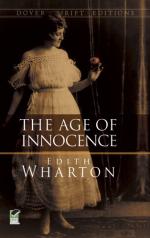Once they were settled in their compartment, and the train, shaking off the endless wooden suburbs, had pushed out into the pale landscape of spring, talk became easier than Archer had expected. May was still, in look and tone, the simple girl of yesterday, eager to compare notes with him as to the incidents of the wedding, and discussing them as impartially as a bridesmaid talking it all over with an usher. At first Archer had fancied that this detachment was the disguise of an inward tremor; but her clear eyes revealed only the most tranquil unawareness. She was alone for the first time with her husband; but her husband was only the charming comrade of yesterday. There was no one whom she liked as much, no one whom she trusted as completely, and the culminating “lark” of the whole delightful adventure of engagement and marriage was to be off with him alone on a journey, like a grownup person, like a “married woman,” in fact.
It was wonderful that—as he had learned in the Mission garden at St. Augustine—such depths of feeling could coexist with such absence of imagination. But he remembered how, even then, she had surprised him by dropping back to inexpressive girlishness as soon as her conscience had been eased of its burden; and he saw that she would probably go through life dealing to the best of her ability with each experience as it came, but never anticipating any by so much as a stolen glance.
Perhaps that faculty of unawareness was what gave her eyes their transparency, and her face the look of representing a type rather than a person; as if she might have been chosen to pose for a Civic Virtue or a Greek goddess. The blood that ran so close to her fair skin might have been a preserving fluid rather than a ravaging element; yet her look of indestructible youthfulness made her seem neither hard nor dull, but only primitive and pure. In the thick of this meditation Archer suddenly felt himself looking at her with the startled gaze of a stranger, and plunged into a reminiscence of the wedding-breakfast and of Granny Mingott’s immense and triumphant pervasion of it.
May settled down to frank enjoyment of the subject. “I was surprised, though—weren’t you?—that aunt Medora came after all. Ellen wrote that they were neither of them well enough to take the journey; I do wish it had been she who had recovered! Did you see the exquisite old lace she sent me?”
He had known that the moment must come sooner or later, but he had somewhat imagined that by force of willing he might hold it at bay.
“Yes—I—no: yes, it was beautiful,” he said, looking at her blindly, and wondering if, whenever he heard those two syllables, all his carefully built-up world would tumble about him like a house of cards.
“Aren’t you tired? It will be good to have some tea when we arrive—I’m sure the aunts have got everything beautifully ready,” he rattled on, taking her hand in his; and her mind rushed away instantly to the magnificent tea and coffee service of Baltimore silver which the Beauforts had sent, and which “went” so perfectly with uncle Lovell Mingott’s trays and side-dishes.




